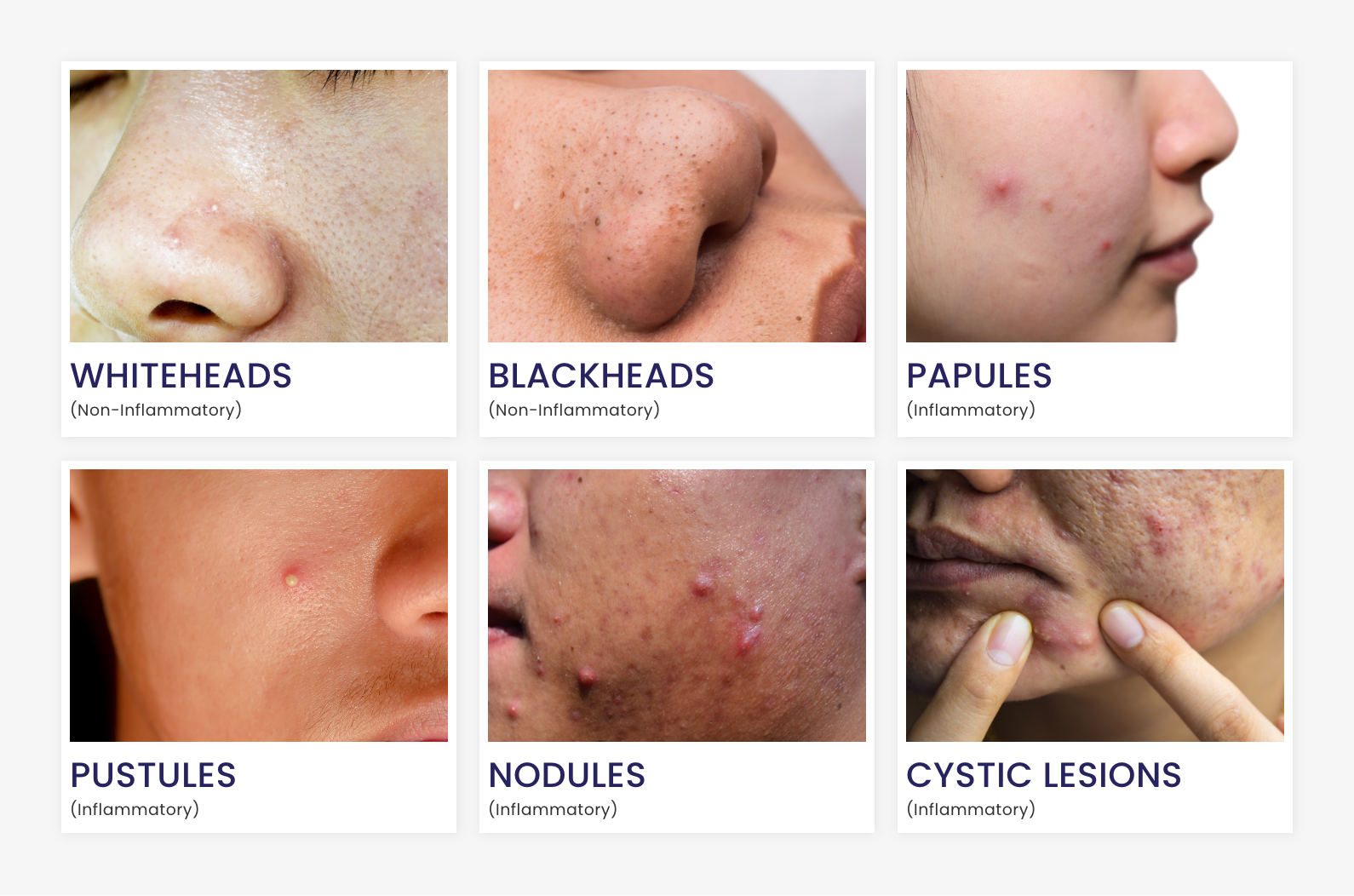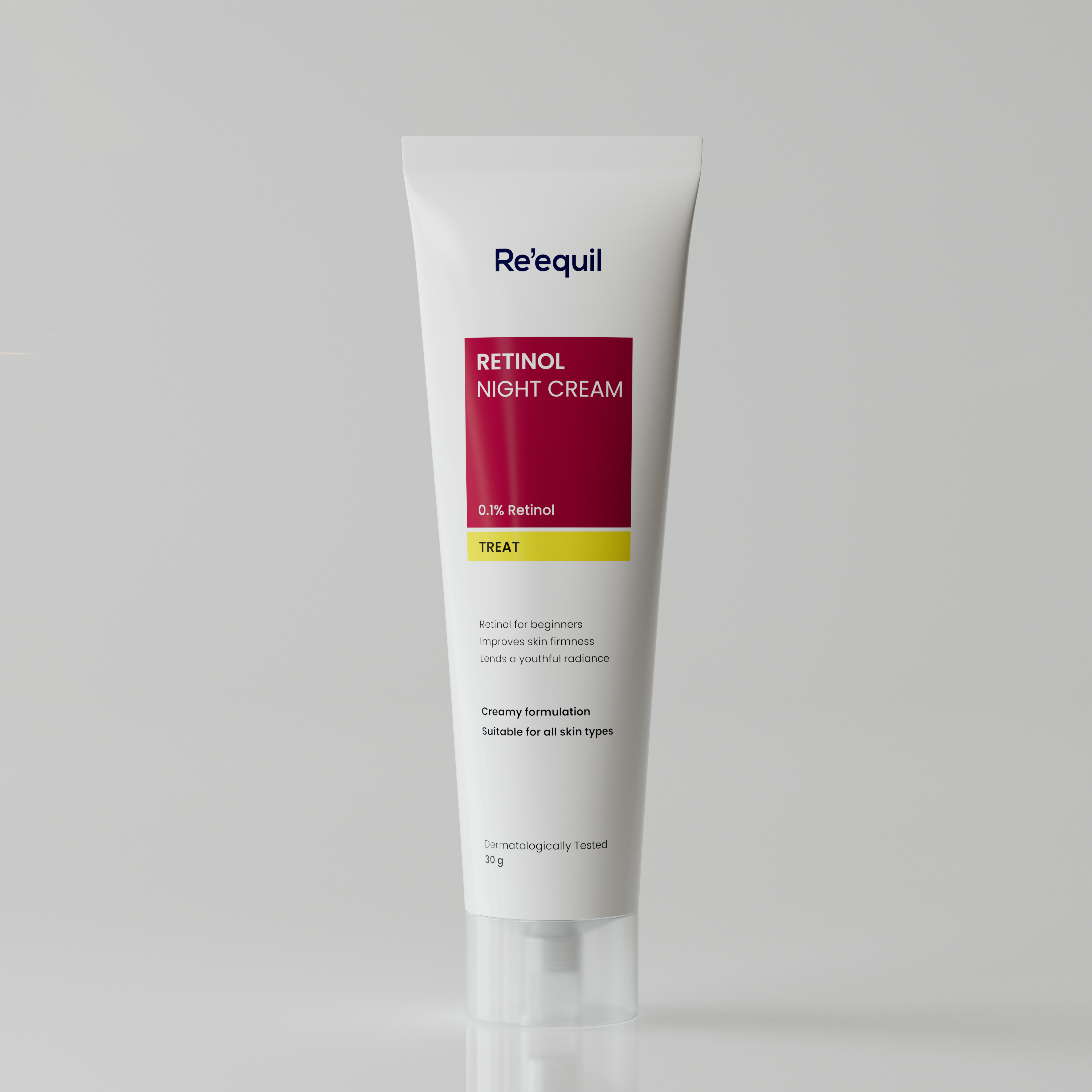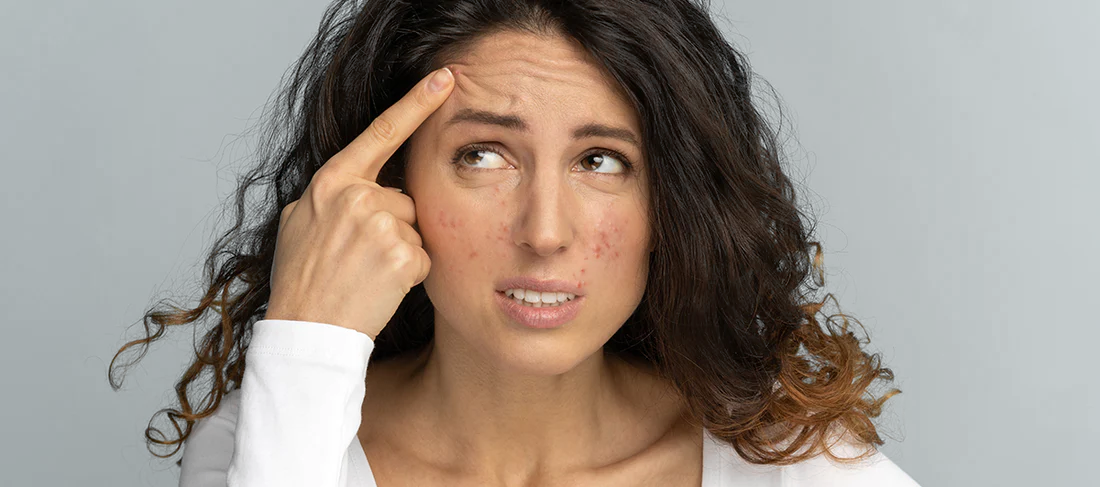It isn’t always the case that an occasion is around and suddenly acne pops up. Acne is a skin condition and there are reasons why it happens. We find it stubborn and hence try our best by experimenting with one product after the other on our skin just to fix this up. But, unfortunately, it just worsens the existing acne.
Read below to know why acne is caused and what are its various types. Know how it can be treated.
Why do you get acne?
Acne happens when hair follicles under the skin become clogged with excess oil from excessive sebum production, dead cells, bacterial infection, and dirt particles. The clogged pores may inflame the hair follicles causing painful breakouts. And when the congested pores do not inflame the follicles, they form pain-free non-inflammatory acne.
Quick Enlightenment - Acne can appear on any skin type- oily, combination, and even dry skin.
6 Major types of acne
Generally, acne can be categorized into 6 major types:
1. Whiteheads (non-inflammatory)
This type of acne forms when you have clogged pores with bacteria, oil, or dead skin cells stuck. These are not painful in nature.2. Blackheads (non-inflammatory)
Such non-painful acne type appears within open pores which are clogged with impurities like dirt, or extra sebum from sebaceous glands.3. Papules (inflammatory)
These develop when the impurities clogged into the pores inflame the hair follicles. It does not have visible pus.
4. Pustules (inflammatory)
It is the next stage of Papules. Here, the acne develops visible blobs of pus. It can cause pain in the affected area.
5. Nodules (inflammatory)
This type of acne is painful with acne lesions deep under the skin. It appears as red bumps on your skin and may take a few weeks to heal.6. Cystic lesions (inflammatory)
Cystic acne is the stubborn form of nodular acne. It is deeply rooted under the skin damaging the layers. It is the most painful of all types of acne. This is why it should not be ignored.
Note - Irrespective of the type, acne can happen to anyone- teenagers as well as adults.
The visible difference is that teenagers develop acne (mainly cystic) in the T-zone (forehead, nose, and chin). While adults have acne around the chin and jawline and the level of severity depends on the cause.
Skincare tailored to your acne-prone skin
Dr. Geetika Mittal Gupta, Celebrity Cosmetic Dermatologist, Founder, and Medical Director, ISAAC explains that by following the right skin care regimen, it is possible to clear your acne fast.
A good skincare routine will definitely reflect on your face. Here is a simplified skincare regimen for you to get smooth skin.
1. Start with a mild, sulfate-free, “non-comedogenic” cleanser
As per skin care experts, an unclean face is the most favorable environment for microbial flora to thrive. So, don’t forget to wash your face twice each day with a mild face cleanser that contains acne-fighting ingredients.
A research study mentioned in the International Journal of Molecular Sciences has evaluated that the anti-inflammatory and antimicrobial properties of Zinc PCA are found quite effective to treat pimples. Additionally, when you are suffering from acne, a face wash that does not cause clogged pores (non - comedogenic) and is free of sulfates, acts as a skin savior.
2. Follow up with an alcohol-free toner to deeply cleanse your pores
Adding a toner after cleanser benefits your skin not just by clearing the left-off makeup or dirt residues, but it helps balance your skin's pH as well, which is an incredibly important aspect of preventing breakouts.
Ensure that you use an alcohol-free toner. This is because alcohol dries out your skin which is not good for acne-prone skin.
3. Use an antioxidant serum to heal acne lesions
After toning, using a serum can be a wise move in your skincare routine. Look for a serum that is rich in antioxidants, and peptides. Both these ingredients can help you with healing painful acne lesions as well as aging.
4. Moisturize with a lightweight moisturizer
As discussed earlier, skipping moisturizer is a big no-no when it comes to acne-prone skin, and in general as well. So opt for a moisturiser that is- lightweight, non-greasy, non-comedogenic, and hydrating. Some ingredients to look for in a moisturiser for acne-prone skin are salicylic acid, aloe vera, ceramides, tea tree oil, green tea, apple cider vinegar, and niacinamide, etc.
Tip - Opting for an oil-free moisturiser for acne-prone skin can prevent your skin from further acne. It will help keep your sebaceous glands in check.
5. Seal it with a sunscreen
To avoid aggravated acne or post-acne marks induced by the harmful sun rays, seal your skincare with a final step; sunscreen. You should use broad-spectrum sunscreen which is free from oxybenzone as it can trigger acne.
By following these hassle-free steps, you will observe positive differences in your skin and acne concerns.
Effective topical treatments that can speed up your acne healing
In topical treatment options, there are bio-active ingredients that certainly have medicinal properties to target inflammatory conditions like acne. Since they work on balancing out sebum production killing acne-causing bacteria, you will see visible results fast. These can be used in the initial stage of acne as well. They are -
1. Salicylic Acid
Among various over-the-counter acne treatments, topical use of Salicylic acid for active acne treatment is found very effective.
Salicylic acid is an oil-soluble BHA (Beta Hydroxy Acid) that penetrates into pores to remove all the junk and impurities. It acts as an exfoliant that dissolves all the dead skin cells, ultimately reducing the chances of the formation of whiteheads, blackheads, and pustules. In addition, the anti-inflammatory properties of salicylic acid help to soothe inflammation and redness in acne wounds.
2. Niacinamide
It is a great option for anyone with oily acne-prone, combination acne-prone, and dry acne-prone skin. It has multiple benefits that can upscale your skincare game. Niacinamide has anti-inflammatory properties that can calm the irritating zits, sebum balancing nature that controls oil production, and barrier protection ability as it helps in ceramide synthesis.
When used in the right concentration between 3% to 5%, your acne can heal vividly.
3. Specialized Vitamin C- SAP for acne
In general belief, Vitamin C is considered to cause irritation in the skin. But here is some good news! SAP (Sodium Ascorbyl Phosphate) is a specialized form of Vitamin C for acne-prone skin. It benefits your skin by boosting collagen production, improving skin’s elasticity and imparting antioxidants into the skin thereby slowing skin’s aging, healing acne with its antimicrobial properties, and reducing its appearance.
In a nutshell, if you are looking for a solution to get rid of acne, serums can nourish your skin and provide overall healing to it. If you look for advanced treatments on how to remove pimples, medical procedures can be a choice. But be mindful of the fact that sometimes, rather than giving you the desired results, you might get additional harmful side effects. Also, talk to your dermatologist before opting for them. Some of these are as follows -
Lasers/ Light Therapy
This treatment is trending to heal acne scars. Herein, a stimulated laser beam targets the affected area. It goes deep into the layers of skin to get rid of acne-causing bacteria and control oil production. But on the other hand, it can damage the layers of the skin and cause post-treatment inflammation, and redness on your skin.
Chemical Peels
These are used to remove the already damaged layer of skin with the main ingredient as glycolic acid. This can render smooth skin but it comes with a lot of tender post-skincare routine. Sunscreen is a must after you get chemical peels. Also, it can cause side effects like redness and fungal infections on the skin. So, have a word with your dermatologist before you get them.
P.S.
With acne on your face, you might not consider slathering on sunscreen. However, unprotected sun exposure may worsen your condition. Powerful UVA and UVB rays of the sun cause potential damage to your skin, which adds up to the irritation due to acne. To add to this, if you already have acne scars or pigmented skin areas, then sun rays can darken the pigmentation. As per the advice from most dermatologists, ultra-light sunscreens with non-comedogenic properties are good for people with sensitive skin that is prone to acne.































